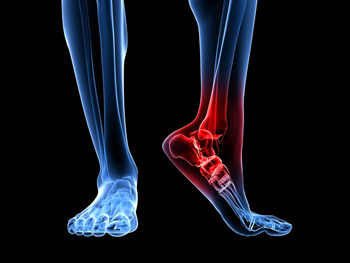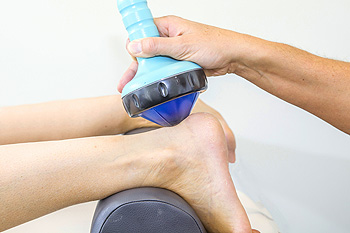Freehold (732) 294-9393
Freehold (732) 294-9393
 The portion of tissue that is found on the bottom of the foot is called the plantar fascia. It connects the heel to the toes, and helps to provide flexibility to the foot while walking and running. When this band of tissue becomes inflamed as a result of an injury or from overuse, the condition plantar fasciitis may develop. The symptoms that are generally associated with this condition can include severe pain and discomfort in the heel and surrounding area, and this pain may be worse in the morning after arising. Some patients find mild relief when the affected foot is rolled on a cold bottle, as this may be helpful in relaxing the affected muscles. If you suffer from plantar fasciitis, it is strongly suggested that you are under the care of a podiatrist who can properly treat this condition.
The portion of tissue that is found on the bottom of the foot is called the plantar fascia. It connects the heel to the toes, and helps to provide flexibility to the foot while walking and running. When this band of tissue becomes inflamed as a result of an injury or from overuse, the condition plantar fasciitis may develop. The symptoms that are generally associated with this condition can include severe pain and discomfort in the heel and surrounding area, and this pain may be worse in the morning after arising. Some patients find mild relief when the affected foot is rolled on a cold bottle, as this may be helpful in relaxing the affected muscles. If you suffer from plantar fasciitis, it is strongly suggested that you are under the care of a podiatrist who can properly treat this condition.
Plantar fasciitis is a common foot condition that is often caused by a strain injury. If you are experiencing heel pain or symptoms of plantar fasciitis, contact Dr. Henry Miller from New Jersey. Our doctor can provide the care you need to keep you pain-free and on your feet.
What Is Plantar Fasciitis?
Plantar fasciitis is one of the most common causes of heel pain. The plantar fascia is a ligament that connects your heel to the front of your foot. When this ligament becomes inflamed, plantar fasciitis is the result. If you have plantar fasciitis you will have a stabbing pain that usually occurs with your first steps in the morning. As the day progresses and you walk around more, this pain will start to disappear, but it will return after long periods of standing or sitting.
What Causes Plantar Fasciitis?
There are some risk factors that may make you more likely to develop plantar fasciitis compared to others. The condition most commonly affects adults between the ages of 40 and 60. It also tends to affect people who are obese because the extra pounds result in extra stress being placed on the plantar fascia.
Prevention
There are a variety of treatment options available for plantar fasciitis along with the pain that accompanies it. Additionally, physical therapy is a very important component in the treatment process. It is important that you meet with your podiatrist to determine which treatment option is best for you.
If you have any questions, please feel free to contact our office located in Freehold, NJ . We offer the newest diagnostic and treatment technologies for all your foot care needs.
 Research has indicated that running shoes are the most important purchase a runner can make. There are several choices available, which is why it is beneficial that proper knowledge is acquired before a purchase is made. There are three portions of each running shoe, consisting of the upper, midsole, and outsole. The upper keeps the foot stable, and consists of the laces and tongue of the shoe. The midsole contains cushioning and governs how the foot moves in the shoe. The outsole controls the traction of how the shoe operates on pavement or trails. Some runners prefer a minimal shoe, which may feel similar to running barefoot. Other runners may enjoy running in shoes that have maximum cushioning and support. If you are interested in buying running shoes, it is advised that you consult with a podiatrist for advice on what style of shoe is best suited for your running preferences.
Research has indicated that running shoes are the most important purchase a runner can make. There are several choices available, which is why it is beneficial that proper knowledge is acquired before a purchase is made. There are three portions of each running shoe, consisting of the upper, midsole, and outsole. The upper keeps the foot stable, and consists of the laces and tongue of the shoe. The midsole contains cushioning and governs how the foot moves in the shoe. The outsole controls the traction of how the shoe operates on pavement or trails. Some runners prefer a minimal shoe, which may feel similar to running barefoot. Other runners may enjoy running in shoes that have maximum cushioning and support. If you are interested in buying running shoes, it is advised that you consult with a podiatrist for advice on what style of shoe is best suited for your running preferences.
If you are a runner, wearing the right running shoe is essential. For more information, contact Dr. Henry Miller from New Jersey. Our doctor can provide the care you need to keep you pain-free and on your feet.
Choosing the Right Running Shoe for Your Foot Type
To increase performance and avoid the risk of injury, it is important to choose the right running shoe based on your foot type. The general design of running shoes revolves around pronation, which is how the ankle rolls from outside to inside when the foot strikes the ground.
If you have any questions please feel free to contact our office located in Freehold, NJ . We offer the newest diagnostic and treatment technologies for all your foot and ankle needs.
Read more about Choosing the Right Running Shoe for Your Foot Type Doctors who specialize in treating foot disorders are known as podiatrists. This type of doctor is known as a Doctor of Podiatric Medicine, and goes by the initials DPM after their name. There are typically eight years of schooling that must be completed. After a bachelor's degree is achieved, the interested student may continue further in a graduate program for four years. This period of time is broken in two phases. The first begins with classroom and laboratory studies, followed by patient care for the next two years. There are several places podiatrists can practice in. These can include hospitals, private practices, or public health services. If you are interested in pursuing a career in podiatry, please speak to a podiatrist who can guide you in determining if this is the right choice for you.
Doctors who specialize in treating foot disorders are known as podiatrists. This type of doctor is known as a Doctor of Podiatric Medicine, and goes by the initials DPM after their name. There are typically eight years of schooling that must be completed. After a bachelor's degree is achieved, the interested student may continue further in a graduate program for four years. This period of time is broken in two phases. The first begins with classroom and laboratory studies, followed by patient care for the next two years. There are several places podiatrists can practice in. These can include hospitals, private practices, or public health services. If you are interested in pursuing a career in podiatry, please speak to a podiatrist who can guide you in determining if this is the right choice for you.
If you are dealing with pain in your feet and ankles, you may want to seek help from a podiatrist. Feel free to contact Dr. Henry Miller from New Jersey. Our doctor can provide the care you need to keep you pain-free and on your feet.
What Is a Podiatrist?
A podiatrist is a doctor of podiatric medicine who diagnoses and treats conditions of the foot, ankle, and related structures of the leg. Your podiatrist may specialize in a certain field such as sports medicine, wound care, pediatrics, and diabetic care. Podiatrists have the ability to become board certified through training, clinical experience, and then taking an exam.
What Do Podiatrists Do?
On a daily basis, a podiatrist may perform the following activities:
It is very important that you take care of your feet. It’s easy to take having healthy feet for granted, however foot problems tend to be among the most common health conditions. Podiatrists can help diagnose and treat a variety of feet related conditions, so it is crucial that you visit one if you need assistance.
If you have any questions please feel free to contact our office located in Freehold, NJ . We offer the newest diagnostic and treatment technologies for all your foot and ankle needs.
 A treatment option that may be effective in treating foot conditions such as plantar fasciitis, is referred to as shockwave therapy. There are typically two ways to administer this type of treatment, and these are known as high or low energy. The latter is generally given in three or more doses, and there is little to no pain that is felt. The former is given in one session, and may require the patient to be under anesthesia. The purpose of shockwave therapy is to initiate a healing response in the body, which may cause a faster delivery of nutrients to the damaged area. If you have a foot condition that may benefit from the use of shockwave therapy, it is strongly advised that you schedule a consultation with a podiatrist.
A treatment option that may be effective in treating foot conditions such as plantar fasciitis, is referred to as shockwave therapy. There are typically two ways to administer this type of treatment, and these are known as high or low energy. The latter is generally given in three or more doses, and there is little to no pain that is felt. The former is given in one session, and may require the patient to be under anesthesia. The purpose of shockwave therapy is to initiate a healing response in the body, which may cause a faster delivery of nutrients to the damaged area. If you have a foot condition that may benefit from the use of shockwave therapy, it is strongly advised that you schedule a consultation with a podiatrist.
Shockwave therapy is a treatment commonly used to treat various injuries and conditions, particularly plantar fasciitis in the feet. To learn more, consult with Dr. Henry Miller from New Jersey. Our doctor can provide the care you need to keep you pain-free and on your feet.
Shockwave Therapy
Shockwave therapy is a new treatment option designed to treat bone conditions such as tennis elbow, shoulder pain, and others. Shockwave therapy uses high intensity sound waves that are directed to the affected tissues of the body with pinpoint accuracy. The effects are very beneficial, leading to a production of collagen fibers, eliminating inflammation.
Who Benefits from Shockwave?
Shockwave is recommended for patients suffering from heel pain and associated problems. Heel pain is a common condition which can be caused by obesity, overexertion, and spending a substantial amount of time on hard floors with your feet exposed and unsupported.
Fast and Easy
The therapy is actually a simple process that can leave patients feeling better the very next day. Shockwave therapy is not as dramatic as it sounds. It enables more blood flow to effected areas, addressing the source of the problem and allowing treatment to last for a long time.
Treatment & Recovery Time
Shockwave treatment will enable your feet to recover quickly. This is especially important since surgery is not required. It is cost effective and does not require the use of anesthesia. This treatment is a better option to surgery, since it is proven safe.
If you have any questions, please feel free to contact our office located in Freehold, NJ . We offer the newest diagnostic and treatment technologies for all your foot and ankle needs.